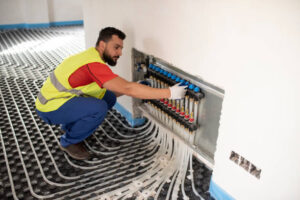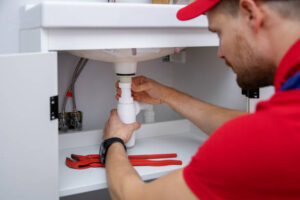When should you run a water heater flush?
Among the most critical aspects of house maintenance is maintaining your water heater. Regular flushing of your water heater will help to keep it lifetime and efficiency intact. But how often should you really run your water heater flush? This blog post will go over the factors affecting flushing frequency, the benefits of routine maintenance, and offer you practical tips about water heater maintenance near me.

First and most essential, let us discuss the reasons you should clean your water heater. Silt and mineral deposits form over time at the base of your water heater tank. These layers could compromise the unit’s performance and efficiency. Flushing the tank guarantees maximum functioning of your water heater by helping to remove these pollutants.
The frequency of flushing your water heater depends on several factors. One key consideration is the type of water your area gets. Living in a location with hard water which contains more minerals you might have to flush your water heater more often. On the other hand, you might minimize cleaning frequency if your water source lacks minerals.
You should also give age of your water heater some regard. The silt accumulation over time could make older models require more frequent flushing. Another factors influencing your daily hot water consumption and residence size are If you have a large family or use hot water heavily, more frequent flushing could be needed to maintain excellent performance.
How often then should you flush your water heater? Usually speaking, you should flush your water heater at least once a year. By enabling your system to stay clean and efficient, this extends its lifetime. On hard water systems, however, cleansing the unit every six months can assist to prevent too much sediment accumulation.
Understanding the requirement of cleaning your water heater and the recommended frequency, let us now go over the exact process of doing it.
Make sure you cut off the electrical source before starting any water heater maintenance. This will prevent whatever mishaps or injuries.
Turn off the cold-water supply by locating the valve providing it to your water heater.
Run a hose toward the suitable drainage point from the drain valve at the bottom of your water heater. To let the water completely go off, open the valve. Given the water will be hot, take necessary caution and stay away from touch.
While the drain valve is still open to empty the tank from the silt, open the cold-water supply valve for a few minutes. This deletes any last pieces.
Close the drain valve; remove the hose; then turn on the cold-water supply. Let the tank only replenish half then repeat the emptying process once more to ensure a full flush.
Once the flushing operation ends, completely refilled the tank and closed the drain valve. At last turn on the power supply of the water heater.
Following these simple rules will allow you to ensure that your water heater maintains ideal condition, so ensuring continuous hot water delivery.
Regular maintenance including water heater cleaning offers several benefits. It not only increases your machine’s lifetime and performance but also helps to save energy. A clean water heater runs more efficiently, therefore reducing energy consumption and utility expenditures.
Moreover, maintaining good maintenance of your water heater raises your chances of early diagnosis of probable issues. Early little problem identification and resolution can help to prevent perhaps necessary replacement or costly repairs.
Flushing your water heater is really important for regular maintenance. Knowing the factors affecting flushing frequency and following the recommended guidelines will help you to ensure that your water heater runs for many years to come as it should. Remember not to ignore seeing a specialist when your unit requires more care or if you run into any complexity.

Indices Your Water Heater Says It Needs Professional Maintenance
Is the subtle fading of your morning shower? Are everyday tasks needing constant hot water running out for you? It could be time for your dependable water heater some much-needed maintenance. From clean dishes to hot showers, many elements of our daily lives rely on water heaters. Still, they require regular maintenance just as any other equipment if you want them in good repair. This page will walk over the signs that indicate your water heater requires professional attention as well as some tips on where to get trustworthy water heater servicing nearby.
One of the most regularly occurring signs your water heater requires servicing is rusty or discolored water. Obviously something is amiss if the water coming out of your faucet seems anything else than pure. Sediment in your water heater may discolor with time. Expert maintenance can help to eliminate sediment and restore your water to its natural, unadulterated state.
Still another vital sign to keep an eye on is a reduction in water temperature. If your shower is shockingly cold or if your dishwasher isn’t producing hot water as it used to, you should bring in the pros. To ensure your water heater is working at optimal capacity, a certified specialist can find the issue and provide the necessary repairs or adjustments.
Leaching near your water heater is never a good indicator. It not only highlights a weakness in your apartment but also might cause water damage in your residence. Should you see puddles or moisture near your water heater, you have to act quickly. Ignoring the issue could result in costly repairs or possibly replacement is needed. See a qualified maintenance professional immediately to assess the situation and stop more damage.
Never ignore strange noise coming from your water heater. Starting to hear rumbling, snaps, or cracks suggests clearly that something is wrong. Usually arising from a build-up of minerals and sediments, these noises could cause your water heater to perform less efficiently and work harder. Expert maintenance services will be able to locate the noise source and provide recommendations for the necessary corrective action.
At last, considering regular professional maintenance if your water heater is getting close to senior age is important. Most water heaters have a 10 to 15 year lifetime depending on use and maintenance. Apart from extending the life of your equipment, frequent maintenance ensures that it stays working securely and efficiently.

Several factors should be considered while seeking consistent water heater maintenance close by. Look for a reliable company featuring seasoned water heater maintenance experts. Choosing a reliable service provider also rely on reading client reviews and asking friends and family for advice.
Remember that your water heater is a required appliance that requires proper maintenance to run as it ought. Regular maintenance helps to identify and correct any issues before they become costly repairs or replacements. Responding early and paying attention to the symptoms will enable you to ensure that your water heater will continue to provide you consistent hot water for many years to come.
If you find rusty water, a drop in temperature, leaks, weird sounds, or an old water heater, then don’t hesitate to call a certified maintenance service. They will ensure your water heater is in shape such that, always having hot water available anytime you need it.


